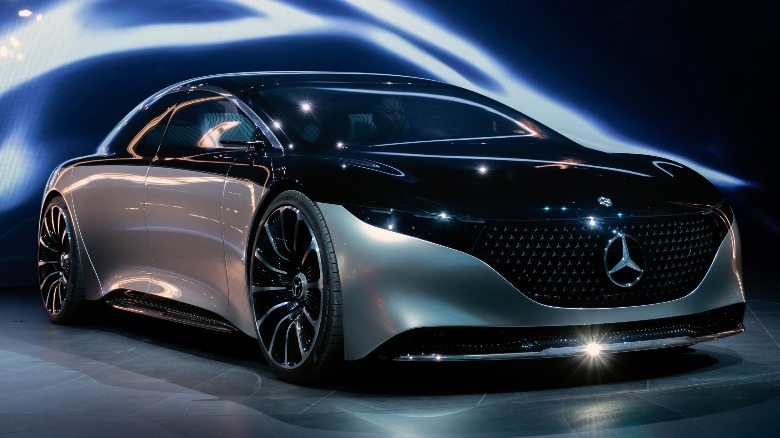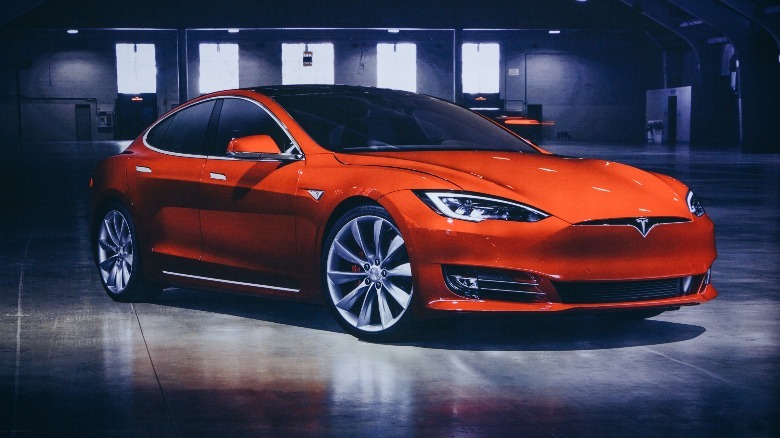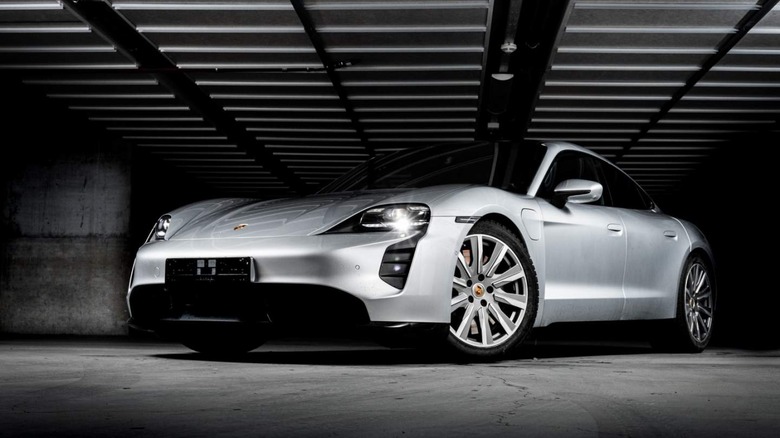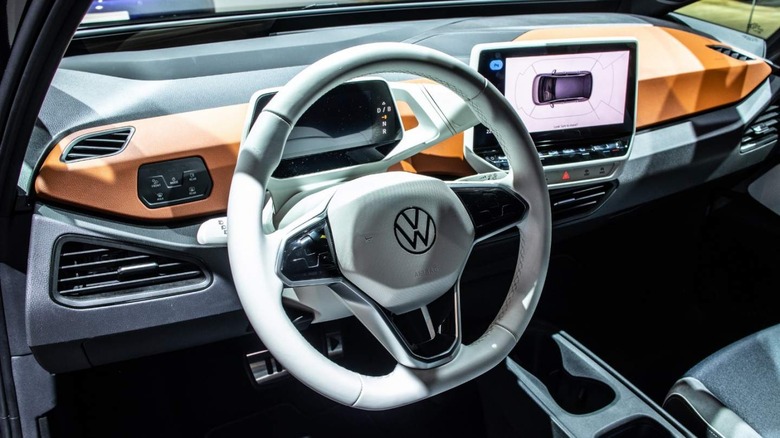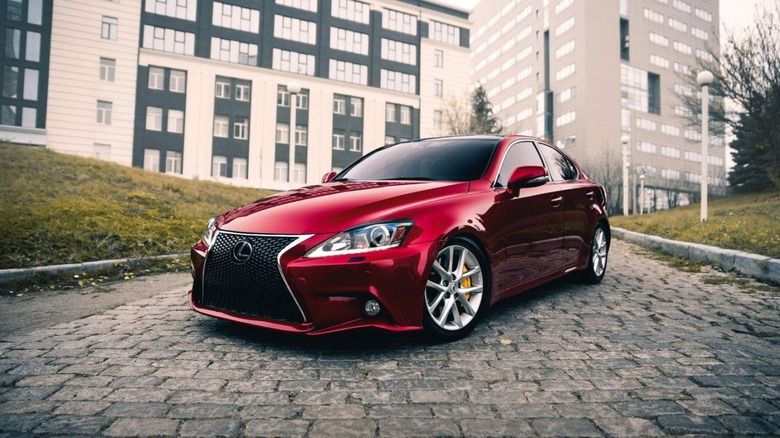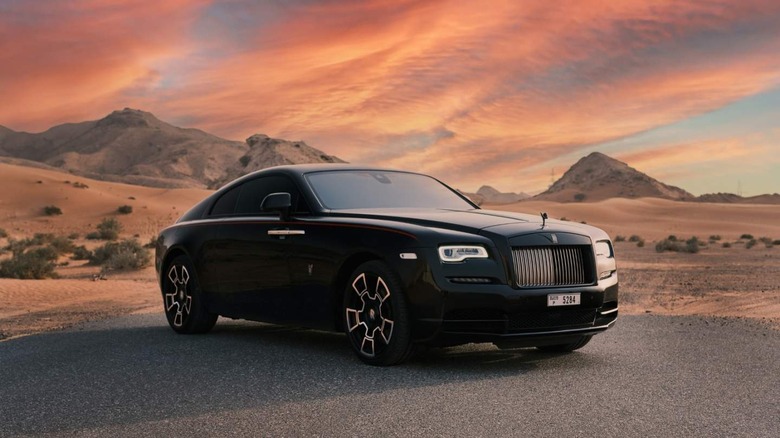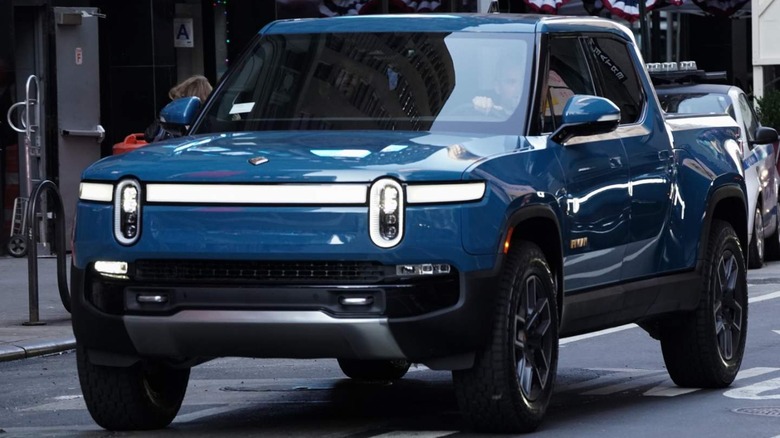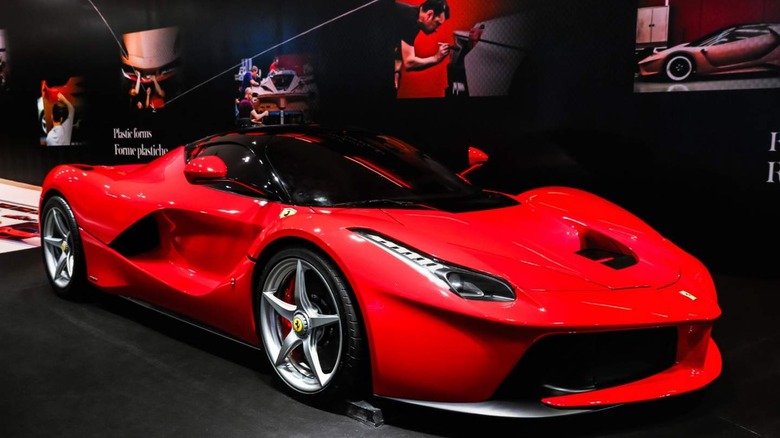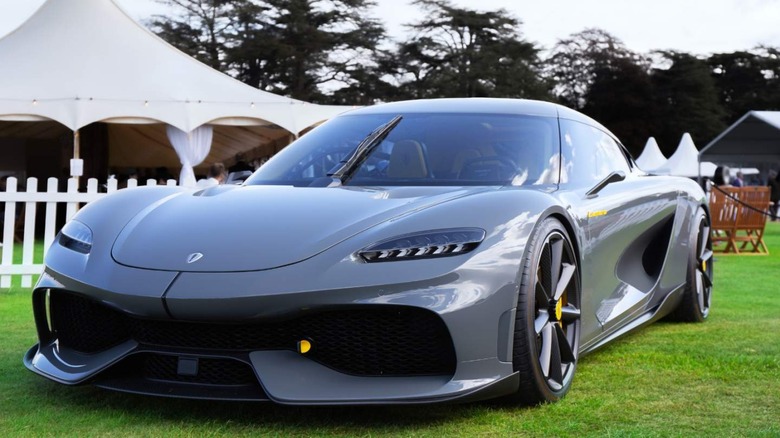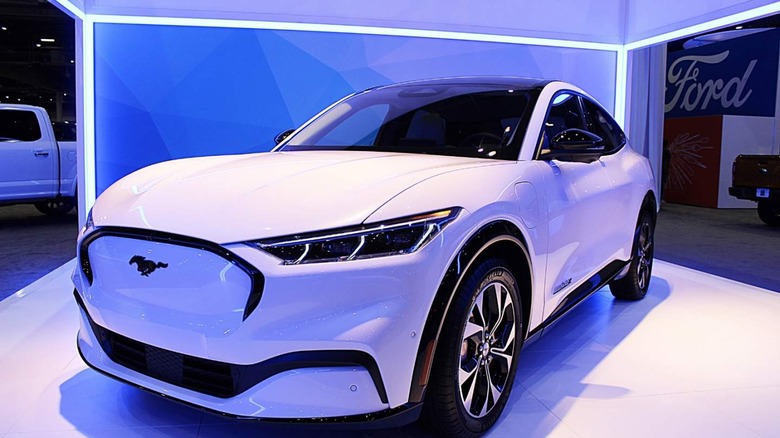The 10 Car Brands With The Best Tech
Modern cars are a result of decades of industrial development enhanced by the advanced technology of the computer age. Analog vehicles are a thing of the past, with carburetors, points, and even manual window cranks the domain of the classic car show. It makes no difference if the car is a lowly entry-level hatchback or the fanciest luxury land barge — computers control everything.
It is not just engine management that requires silicon for high efficiency and low emissions: windows, wipers, and seat heaters all operate through electronic control units. Technology is everywhere, and more creeps into vehicles each year, bringing touch screens, refrigerators, and even surveillance cameras into the driving experience. But even with the ubiquitous presence of electronic controllers in all our vehicles, some automakers present the technology or utilize it better than others. Here are ten that do it best.
Mercedes-Benz
Always at the leading edge of luxury, Mercedes-Benz is also a leader in technology. With developments in everything from safety and comfort to performance and speed, MB is an aggressive, bold, and inventive manufacturer. As an innovator in the industry, MB has introduced many firsts for production vehicles, including fuel injection in the 1955 300SL gullwing, crumple zones in the 1959 220, and seat belt pretensioners in the 1981 S-Class.
Today, MB is at the forefront of emerging electric propulsion technology. With the introduction of the all-electric EQS for the 2022 model year, MB is leaving its mark and upholding its legacy as a leader in automotive tech. While this car is not set to take the world by storm with a dazzling array of futuristic space-age gizmos and gadgets, it will set MB comfortably atop the pile as the leader in luxury and tech. And that's not to say it doesn't deliver some cutting-edge technology. The dashboard consists primarily of a 56-inch Hyperscreen running from end-to-end with screens dedicated to the driver, passenger, and central controls for everything else. It rides on an innovative air suspension with each corner computer-controlled to react to road conditions, and boasts plenty of electric power with a range of up to 350 miles. Simply put, Mercedes does not rest on its laurels.
Tesla
Led by arguably the world's most eccentric billionaire CEO, Tesla nears the top of any list involving cars and tech. Being the first to make an electric car viable for the masses is but one of the many impressive achievements that place Tesla firmly at the leading edge of auto technology. The manufacturer's single most defining quality as an automaker is its ability to integrate novel tech and put it into production. Many of today's commonplace automotive features started as what was once seen as crazy Tesla innovations.
One of the best-known of these features that has become ubiquitous today is the large touch screen found in most new cars. These screens have been a staple of the Tesla driving experience since the launch of the Model S in 2012. Tesla also pioneered autonomous driving, auto-hiding door handles, and seamless integration with mobile devices into the operation of the car.
While many comfort features and driving aids from Tesla have found their way into all manner of cars from multiple manufacturers, much of the groundbreaking engineering is deep below the surface. Tesla became the first company to offer a vehicle that provided a useful electric driving range to rival gas-burning vehicles thanks to innovative battery management and efficient motors. Combine this with the clever use of cameras for safety and security as well as "black box"-type functions in the event of a crash, and you have a car packed full of tech that delivers a good ownership experience and a great drive.
Porsche
Porsche's flagship 911 model is produced today with the same basic design and shape as when it was introduced nearly 60 years ago, yet continues to be one of the most exciting machines on the road. In the free market capitalist system in which we exist, no company can produce the same product year after year and expect to stay in business. Yet Porsche has shown that as long as an automaker keeps up with the times and injects modern innovation into a proven platform, it can remain relevant.
For Porsche, retaining the shape and layout of the 911 is paramount, and it appears that as long as there is a Porsche, there will be a 911. And as long as there is a 911, it will be a rear-engine 4 seat fastback. And yet, in order to keep up with the times, Porsche has made many changes along the way, like adding water cooling to their cars in the late '90s. Although many special models can still be had with a traditional manual transmission, dual-clutch transmissions became standard shortly after, and today's cars now feature screens for info display and controls for climate and entertainment.
As always, where Porsche excels is in performance from the latest 911 Turbo S churning out upwards of 700 hp with less than four liters of displacement to the all-electric Taycan, a sleek and attractive all-electric alternative to the Tesla Model S. As a leader in performance and luxury, Porsche technology will always be a force to be reckoned with.
Volkswagen
After producing one of the world's best-selling cars nearly unchanged from the 1930s to the 1970s, Volkswagen sought to remake itself as a modern carmaker and has consistently pushed the envelope up to the modern day. This push to innovate sees them heading into a future devoid of oil with their ID series electric vehicles.
Wanting to put the debacle of Dieselgate as far in the rearview mirror as possible, VW is going all-in on electric. Not only has the company chosen to stop the development of gasoline engines, but it has also committed to stop production altogether. To meet these lofty eco-friendly goals, they developed the all-new MEB platform for use on a range of electric vehicles. It appears that VW is the first legacy manufacturer to go all-in on electric and will be using the MEB platform for a variety of vehicles on all continents where they are sold. With up to 340 miles of range from 148-204 hp, they are not setting any benchmarks, but they are setting competent parameters for themselves. Modern VW cars are engaging and fun to drive and provided they transmit the same DNA as current cars into their new platform, VW should continue to be a tech lover's favorite.
Lexus
Knowing they would have to show up ready to impress, Toyota launched Lexus not just to compete with the established German luxury marques but to conquer them. In introducing their first model, the LS400, Toyota invested heavily into research to ensure their vehicle would exceed all standards for smoothness, comfort, and quality, all paired with legendary Toyota reliability. In their endeavor to remain ahead of the Germans, Lexus has continued to bring fresh, innovative technology to their cars without being gaudy and flashy.
Some of the automaker's newest cars can be short on the latest features to come out of Silicon Valley, but only because Lexus knows its customers value proven and reliable features over hype. They want to be pampered where it counts and drive something familiar but current. And that's why Lexus continues to excel in delivering a modern and sophisticated package with just the right blend of cutting-edge and reliable technology.
Rolls Royce
Rolls Royce has been known as the leader in luxury cars since its inception. The company has racked up many great accomplishments to speak of, and today they build cars of luxury and quality that are second-to-none. Building bespoke vehicles for customers with virtually limitless finances means technology must be the best on offer from anywhere. Because Rolls Royce is now a subsidiary of BMW, they have plenty of mechanical bits at their disposal to ensure their cars are powered by the most powerful and efficient engines along with the smoothest transmissions and supple suspensions.
But where Rolls Royce shines is in catering to the needs of the discerning passenger and anticipating those needs before owners even think about them. The Rolls Royce experience is replete with exotic woods, premium leather, and plush carpeting, enveloping the passenger in a complete driving experience. The headliners showcase a galaxy of fiber optic stars that twinkle and glow, providing subtle ambient lighting to the interior. Rear seat passengers are treated to individual infotainment packages that accompany fold-down tray tables similar to those found on aircraft, only much nicer. For all these reasons and more, Rolls Royce is the pinnacle of luxury and technology all in one.
Rivian
As the automotive new kid on the block, Rivian has much to prove. To draw buyers away from legacy automakers, Rivian needs to offer car buyers reasons to leave their trusted brands, and they deliver it in spades. The upcoming but already-in-production electric truck models boast impressive technical specs right out of the gate, but the extras are the real jewel in Rivian's crown.
Rivian's base model truck starts with a motor on each of all four wheels producing around 800 hp combined, which, according to the automaker, is capable of propelling the truck from 0 to 60 in just three seconds flat. With four motors, the truck is AWD but also capable of handling uneven terrain by operating the motors separately from each other to get the best grip or forward motion. It also has a hat trick called "tank feature" where left and right side wheels can spin in opposite directions, causing the truck to spin circles as if you pull the drive levers of a tank in opposite directions.
In addition to all of the features that make the truck a capable and enjoyable vehicle to drive are many functional accessories. It sports five 110V power outlets along with several USB-C outlets, a rechargeable flashlight in the door, a Rolls Royce umbrella, and a removable Bluetooth speaker with a built-in LED lantern. Behind the cab is a pass-through compartment large enough for a golf bag, some lumber, or many fishing poles. This itself is pretty cool, but the doors are on both sides of the bed and double as steps. An optional camp kitchen is available to mount to one of these steps and turn your Rivian into a full-on outdoorsman special. In short, Rivian is showing up to the technology party well-prepared.
Ferrari
From the beginning, Enzo Ferrari pushed his engineers to be the best both on the track and the street. With a long and storied tradition of being first to the finish line, Ferrari knows how to adapt cutting-edge engineering to performance. Not willing to let other automakers wear the crown, Ferrari insists on the best tech to remain king of the autostrada. Ferrari cars are expensive, and buyers know what to expect when they purchase one. They expect a certain level of luxury, but mostly they want a car that handles and performs better than anything else on the road.
Cars such as the F40 and F50 showed what Ferrari can do in applying what they learned on the track to the street with the twin-turbo V8 of the F40, and the V12 F1 engine in the F50. Their current flagship La Ferrari utilizes a version of the F1 KERS system to create a 963 hp mild-hybrid street rocket. The latest in tech from Maranello is a completely new design V6 set up to be their first plug-in hybrid drivetrain and will power the upcoming 296 GTB. The list of technical achievements from Ferrari is long and impressive, and that's why as far as tech goes, they are one of the best.
Koenigsegg
Since its inception, Koenigsegg has produced cars that push the envelope of what is possible with a performance automobile. Anyone familiar with Koenigsegg knows they build some outlandish, powerful, and wildly advanced hypercars. All of them are packed with the latest engineering and tech available and offer plenty of great tech talking points. Case in point, the upcoming Gemera.
The Gemera is being produced starting with the 2022 model year, and is poised to be the first-ever four-seat supercar. While it seats four, it still retains a two-door setup, but instead of being a sports car with barely enough room to squeeze in a couple of school-age children, the amazing dihedral synchro-helix doors are long enough to provide comfortable ingress and egress for all four occupants. The vehicle is powered by a twin-turbocharged 2.0 liter, 3-cylinder engine producing more than 600 hp thanks to its innovative Freevalve system, which actuates valves without a camshaft, chain, belt, or gears.
The engine, officially dubbed the Tiny Friendly Giant, is coupled to three electric motors to deliver a final power rating of 1700 hp. It also boasts a novel method for distributing torque to the wheels with two of the electric motors propelling the rear wheels and the engine driving the front along with another electric motor. It is difficult to fully articulate the complexity and ingenuity of this vehicle, which is exactly why it stands out as a great example of why Koenigsegg is among the producers of the world's finest automotive tech.
Ford
As one of the oldest and best-known auto companies in America, Ford Motor Company is usually known for making good, dependable vehicles ordinary people can afford. And while it is exquisitely competent at producing a full range of "cars of the people," the introduction of the Mustang Mach-E and the F-150 Lightning show that Ford is more than capable of keeping up with the modern age. And innovation is nothing new for a company that, more than a century ago, pioneered the assembly line and worker pay that made it possible for Ford employees to actually afford one of the cars they built.
Today, Ford is looking toward a future that will be dominated by the electric car. Not wanting to be left behind, they have taken two of their best-selling and longest-running nameplates to take the lead on electrification. Fully aware that the venerable F-150 pickup truck is the number-one selling truck in the United States, Ford developed an electric version called the F-150 Lightning with impressive technical specs and useful accessories, including up to 11-120VAC power outlets for powering everything from tailgating stereos to table saws and hammer drills.
Some of the most loyal fanbase of the long-lived Ford Mustang might feel alienated by the introduction of a new Mustang that not only loses its V8 engine but gains two extra doors. Silly fanboy arguments aside, the Mustang Mach-E is a serious performance powerhouse, delivering up to 480 hp and a range up to 300 miles. Ford sees its future in technology, and that's why it gets a slot on this list.

